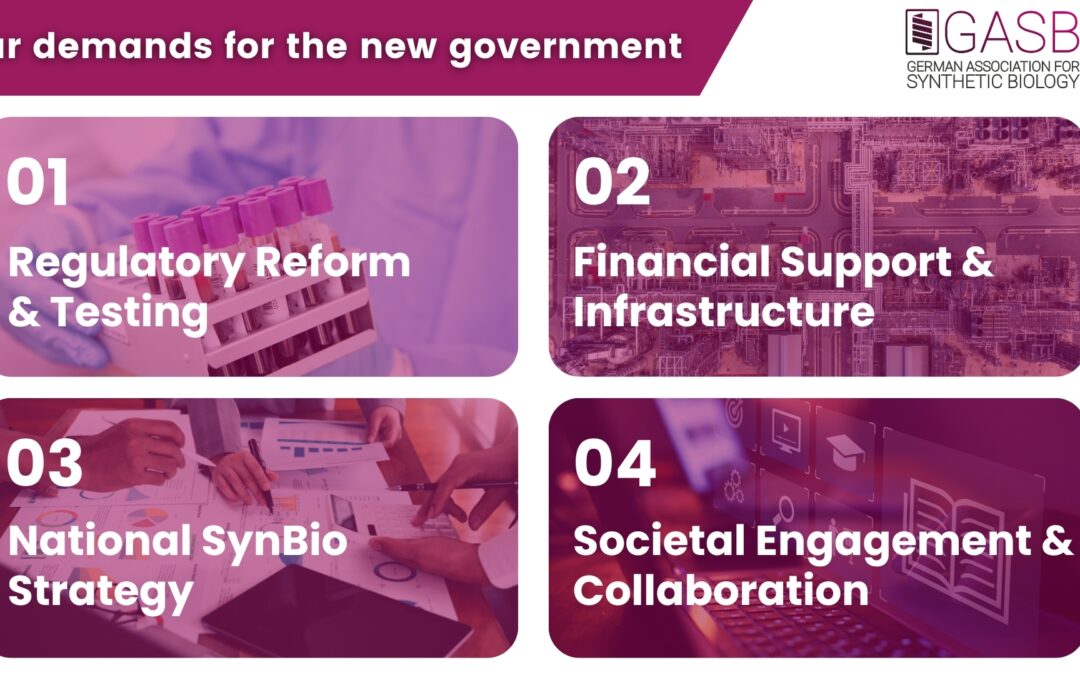2025 started an eventful year not only in international politics, but also in Germany: Following the federal election in spring, a new government between the Christian Democratic Union (CDU) and the Social Democratic Party (SPD) has taken office.
This newly formed coalition not only has to face several international challenges, but also takes office at a directive time for the future of the German economy, climate goals, and European life sciences and biotechnologies.
This August, the new government has been in office for 100 days, with major reforms in the field of synthetic biology yet to happen. GASB wanted to take the opportunity to assess how much new air and momentum the new government could bring to the table and asked its community:
How well do you see the interests of the SynBio community represented in politics? What wishes and demands do you have for our new government?
Politics Survey attracted diverse participation
More than one-third (36%) of survey participants currently hold a permanent position or professorship in the SynBio field, while 18% are working in the startup and industry sector. The other half of the votes was equally distributed among other positions in the academic research community, from students to postdoctoral researchers and junior group leaders, with 4% of participants professionally active in the policy & governance sector.
Three-quarters (75%) of participants consider the interests of the synthetic biology community poorly or rather poorly represented in German politics (rating 1-3 / 7 on a relative metric scale). Only 11% consider the interests rather well represented, with 14% seeing the interests to be moderately represented.
Regulatory reforms and testing environments can facilitate innovation applications
When asked about specific points, participants expressed an urgent need for change. Several wishes became evident across all sectors and backgrounds: among others, participants called for holistic regulatory reform that takes into account recent advances in the predictability and safety of genetic tools, while also removing bureaucratic hurdles from Germany’s Genetic Engineering Act (GenTG) and related ordinances. But also, recent developments in international policy were frequently mentioned; for example, several participants call for a proactive support in the EU Commission and Parliament of recent regulatory advancements enabling the responsible application of New Genomic Techniques in agriculture. Generally, respondents demand more opportunities to translate advanced synthetic biological research to the real world by creating spaces for safe experimentation and product testing through regulatory sandboxes, early-use zones, reduced compliance burdens for pilot-scale applications, and voluntary consumer testing. Louis Schanzmann, Head of Steering at GASB, explains: “At our startup event this year, the SynBioReactor, these issues were communicated very clearly. Products that contain genetic engineering have a very bad reputation, which does not reflect the scientific evidence on their safety. Public support for synthetic biology by the government through public statements, programs, better regulations, and prestigious projects is an important step that synthetic biology and society need today.”
Leveraging financial instruments for deploying a SynBio entrepreneurial ecosystem
The financial support and funding for synthetic biological research were another key issue frequently thematised. Participating researchers wish for dedicated funding lines with a long-term and interdisciplinary scope, considering synthetic biology research as a technology of interest to several national economic and climate protection goals.
Next to research funding, investment specifically into infrastructure projects, such as biofoundries and high-throughput platforms, was frequently mentioned among participants. By investing in national biofoundry nodes and supporting shared-use infrastructure, Germany could also benefit from better integration into European networks like the Industrial Biotechnology Innovation and Synthetic Biology Accelerator (IBISBA) or the Global Biofoundry Alliance (GBA).
Such projects could be federally supported and co-financed regionally, aligning with regional structural change strategies. Public-private partnerships between research institutions and industry could mitigate risks associated with early-stage applications and should be promoted. Furthermore, the government could create incentives for research & development (R&D) and venture capital investments from the private sector.
“Other European countries already promote R&D investments or localized intellectual property through the provision of tax credits, such as the Crédit d’Impôt Recherche (CIR) program in France, or the Innovation Income Deduction (IID) regime in Belgium.”, comments Florian Hänsel, Head Officer for Politics at GASB. “Investing in small and research-intensive startups can also be made more attractive for investors – the Enterprise Investment Scheme (EIS) and Seed Enterprise Investment Scheme (SEIS) in the UK present good models of incentivizing and attracting valuable investments in the entrepreneurial ecosystem.”
A comprehensive strategy across sectors enables coordinated innovation policy
Beyond specific wishes for enhancing research and scale-up of synthetic biology and its products, the GASB community commonly raised its voice for a comprehensive National Synthetic Biology Strategy, to outline clear policy goals, funding priorities, ethical frameworks, and industrial applications of synthetic biology. Hänsel comments: “In our work, we frequently encounter exciting SynBio ventures hindered by the regulatory complexity imposed by several different levels of legislation – whether it is biosafety laws, European food policies, or lengthy approval processes on the construction of synthesis plants, which have previously been approved in other EU countries. A comprehensive national strategy, and establishing a dedicated interministerial coordinator or task force, can identify such bottlenecks, align SynBio initiatives across sectors, and can facilitate more targeted impact than broad declarations of intent or uncoordinated policies from single ministries.”
Furthermore, synthetic biology should explicitly be included in the federal High-Tech Strategy and national Bioeconomy Strategy, considering the vast potential synthetic biology applications offer for designing and manufacturing sustainable materials and chemicals, developing novel therapeutic approaches, supporting resilient food systems, and alleviating the consequences of climate change.
Societal engagement and international collaboration to accompany the biorevolution
While interviewed stakeholders predominantly agreed on the potential impacts of synthetic biology and how to improve lines of regulatory and funding support, several respondents underlined the need for public engagement campaigns to explain these impacts and address public concerns regarding genetic engineering. Participants proposed involvement from both scientific and civil society actors, supporting the expansion of university programs and vocational education related to synthetic biology, as well as establishing various media and learning platforms to accompany the increasing involvement of bioengineering in society.
Finally, many participants propose to strengthen interdisciplinary and international collaboration for synthetic biology through better integration of research disciplines and EU-wide projects. Research networks combining life sciences, engineering, and computational biology can advance the speed of synthetic biology innovations, and the German government should support and strengthen cross-border cooperation and the role of synthetic biology in relevant programs such as Horizon Europe and Circular Bio-based Europe (CBE-JU).
Taking action for political reforms
With the gained insights on the current state, wishes and demands of the German SynBio community, GASB plans to take action and engage with political stakeholders to advance the current landscape towards a progressive and enabling environment for synthetic biology innovations and the circular bioeconomy. We are currently preparing a high-level position paper with specific policy recommendations based on the feedback from our community, and invite government officials and other relevant stakeholders and communities to engage in the dialogue on the future of synthetic biology and its role in economy and society.
Times are turbulent, and expectations are high for the newly formed government. However, decisive and well-coordinated action in the next months holds the potential to really advance the field and enable synthetic biology as a key driver of change for the economic and ecological challenges Germany faces today. By listening to the voice of researchers and industry experts, and strengthening collaborative efforts between sectors and their involvement in policy decisions, Germany can retain its position at the forefront of innovation and potentially become a driving force of a resilient European bioeconomy.

